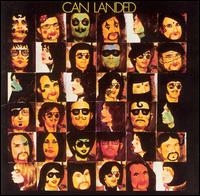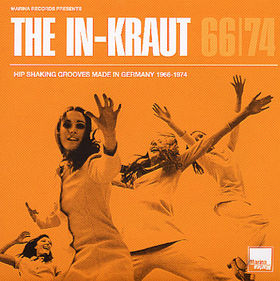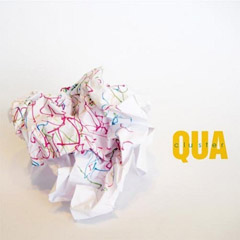Kraut is a German word recorded in English from 1918 onwards as an ethnic slur for a German, particularly a German soldier during World War I and World War II. Its earlier meaning in English was as a synonym for sauerkraut, a traditional Central and Eastern European food.

Can were a German experimental rock band formed in Cologne in 1968 by Holger Czukay, Irmin Schmidt (keyboards), Michael Karoli (guitar), and Jaki Liebezeit (drums). The group featured several vocalists, including the American Malcolm Mooney (1968–70) and the Japanese Damo Suzuki (1970–73). They have been widely hailed as pioneers of the German krautrock scene.
Krautrock is a broad genre of experimental rock that developed in West Germany in the late 1960s and early 1970s. It originated among artists who blended elements of psychedelic rock, avant-garde composition, and electronic music, among other eclectic sources. Common elements included hypnotic rhythms, extended improvisation, musique concrète techniques, and early synthesizers, while the music generally moved away from the rhythm & blues roots and song structure found in traditional Anglo-American rock music. Prominent groups associated with the krautrock label included Neu!, Can, Faust, Tangerine Dream, Kraftwerk, Cluster, Ash Ra Tempel, Popol Vuh, Amon Düül II and Harmonia.

Kenji Suzuki, better known as Damo Suzuki (ダモ鈴木), is a Japanese musician who has been living in Germany since the early 1970s and is best known as the former lead singer of the krautrock group Can.

Neu! were a West German krautrock band formed in Düsseldorf in 1971 by Klaus Dinger and Michael Rother following their departure from Kraftwerk. The group's albums were produced by Conny Plank, who has been regarded as the group's "hidden member". They released three albums in their initial incarnation—Neu! (1972), Neu! 2 (1973), and Neu! 75 (1975)—before disbanding in 1975. They briefly reunited in the mid-1980s.

Harmonia was a West German musical "supergroup" formed in 1973 as a collaboration between members of two prominent krautrock bands: Cluster's Hans-Joachim Roedelius and Dieter Moebius joined by Neu! guitarist Michael Rother. Living and recording in the rural village of Forst, the trio released two albums—Musik von Harmonia (1974) and Deluxe (1975)—to limited sales before dissolving in 1976.

Landed is the sixth studio album by the German krautrock band Can.
This is a discography of the krautrock band Can.

The In-Kraut: Hip Shaking Grooves Made in Germany 1966-1974 is the first volume in The In-Kraut series released by Marina Records on compact disc and double vinyl in 2005.

Urbana Gerila was a former Yugoslav punk rock and new wave band from Belgrade. The band is notable as the participant of the Artistička radna akcija project in 1981. In 1982, the band members formed an ad hoc group Berliner Strasse, influenced by post-punk and krautrock, performing songs with lyrics in German.

Jehovahkill is the eighth album by Julian Cope, released in 1992. After the critical success of Peggy Suicide (1991), Cope's idea for Jehovakill was to incorporate a krautrock attitude into his music. He began recording the album with musicians Rooster Cosby and Donald Ross Skinner, while co-producing it with the latter. The sessions yielded what Cope considered to be his most sonically experimental material to date. Originally titling the record Julian H. Cope, he sent an eleven track version to Island Records, who initially rejected its release, but gave Cope extra recording sessions for the album. During the extra sessions, in which six extra songs were recorded, the album became harder and was retitled Jehovahkill.
Eruption was a short-lived German krautrock or experimental music super group founded by former Tangerine Dream member and then current Kluster member Conrad Schnitzler.

Musik von Harmonia is the debut album from the influential German krautrock group Harmonia, released in January 1974 by Brain Records. Formed by the addition of Neu! guitarist Michael Rother to Cluster, they recorded the album from June to November 1973 in Cluster's Forst recording studio. It was self-produced by the group using a primitive mixer and three tape recorders.

Deluxe is the second album from the West German krautrock group Harmonia, consisting of Neu! guitarist Michael Rother and the Cluster duo of Hans-Joachim Roedelius and Dieter Moebius. It was recorded in June 1975 in Harmonia's studio in Forst, Germany. It was first released on the Brain Records label in 1975.

Qua is the eleventh and final album by German Krautrock band Cluster, released in May 2009 on Nepenthe Music. It is the band's twelfth studio album and first in fourteen years.
Experimental rock, also called avant-rock, is a subgenre of rock music that pushes the boundaries of common composition and performance technique or which experiments with the basic elements of the genre. Artists aim to liberate and innovate, with some of the genre's distinguishing characteristics being improvisational performances, avant-garde influences, odd instrumentation, opaque lyrics, unorthodox structures and rhythms, and an underlying rejection of commercial aspirations.

Canaxis 5 is the only studio album by the Technical Space Composer's Crew, released in 1969 by Music Factory. On later issues, the artist credit was changed to Holger Czukay and Rolf Dammers. The album was remixed for Spoon Records releases and again for the Revisited Rec. release.

Hardcore Breakout USA is an internationally distributed compilation album mostly of artists that are on New Red Archives records. It was originally released in 1990 as a double LP and cassette, but was then subsequently also released as a CD. The album was compiled by New Red Archives. The New Red Archives 1990 pressing of the album was issued as a single LP. The Japanese version Snowboard Addiction - Fun Ride, was released in 1994 and a second edition, Hardcore Breakout USA Volume 2, was compiled and released, in 1995.

Romantic Warriors IV: Krautrock is a trilogy of feature-length documentaries about progressive music written and directed by Adele Schmidt and José Zegarra Holder. RW4 focuses on the progressive rock music from Germany popularly known as Krautrock, although the integration of Krautrock into the progressive rock genre is a purely American notion. In Europe, the conventional wisdom is that Krautrock can be considered at most as the connection between psychedelic rock and progressive rock. The term "Krautrock" was applied after-the-fact by British journalists, and in fact the German bands share very few similarities.

Deutsche Elektronische Musik 2 is a 2013 compilation album released by Soul Jazz Records in 2013. It was a follow-up to their 2010 record Deutsche Elektronische Musik with further tracks covering West German krautrock groups and their music released between 1971 and 1983. It received positive reviews from music publications such as AllMusic, Uncut and Record Collector as well as newspapers such as The Independent and The Province.















